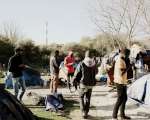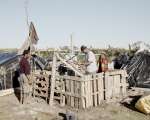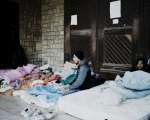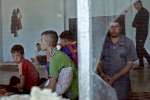UNHCR cautions against European deportations to Iraq
Briefing Notes, 8 June 2010
This is a summary of what was said by UNHCR spokesperson Melissa Fleming – to whom quoted text may be attributed – at the press briefing, on 8 June 2010, at the Palais des Nations in Geneva.
UNHCR understands that four governments – the Netherlands, Norway, Sweden and the UK – are arranging an enforced removal of Iraqi citizens to Baghdad, Iraq later this week. We have not received confirmed information of the number and profile of those individuals and whether some have requested protection
Our position and advice to governments is that Iraqi asylum applicants originating from Iraq's governorates of Baghdad, Diyala, Ninewa and Salah-al-Din, as well as from Kirkuk province, should continue to benefit from international protection in the form of refugee status under the 1951 Refugee Convention or another form of protection depending on the circumstances of the case. Our position reflects the volatile security situation and the still high level of prevailing violence, security incidents, and human rights violations taking place in these parts of Iraq. UNHCR considers that serious – including indiscriminate – threats to life, physical integrity or freedom resulting from violence or events seriously disturbing public order are valid reasons for international protection.
UNHCR appreciates that the international protection needs of Iraqis are assessed by asylum authorities in Europe and elsewhere on an individual basis. We urge those authorities to ensure that the situation in Iraq as a whole, including the important level of lawlessness, is factored into their assessments. While some have proposed that returned Iraqis could reside in other parts of the country from where they originate, UNHCR's position is that no internal flight alternative exists in Iraq because of the on-going levels of violence in Baghdad, Diyala, Kirkuk, Ninewa and Salah Al-Din, and in view of access and residency restrictions in various governorates as well as the hardship faced by returnees in ensuring even survival in areas of relocation.
The continued insurgency in Iraq and on-going violence there has led to large scale internal and external displacement of the Iraqi population, with most refugees living in Syria and Jordan. UNHCR is concerned about the signal that forced returns from Europe could give to other host countries, particularly those neighbouring Iraq.
Special Envoy Angelina Jolie in Iraq
The UN refugee agency's Special Envoy Angelina Jolie visited Iraq this week, meeting with Syrian refugees and internally displaced Iraqi citizens in the Kurdistan Region of Iraq. She offered support to 3.3 million people uprooted by conflict in the country and highlighted their needs.
Jolie spoke to people with dramatic stories of escape, including some who walked through the night and hid by day on their road freedom. She also met women who were among the 196 ethnic Yazidis recently released by militants and now staying in the informal settlement at Khanke.
"It is shocking to see how the humanitarian situation in Iraq has deteriorated since my last visit," said Jolie. "On top of large numbers of Syrian refugees, 2 million Iraqis were displaced by violence in 2014 alone. Many of these innocent people have been uprooted multiple times as they seek safety amidst shifting frontlines."
Photos by UNHCR/Andrew McConnell
Special Envoy Angelina Jolie in Iraq
Cold, Uncomfortable and Hungry in Calais
For years, migrants and asylum-seekers have flocked to the northern French port of Calais in hopes of crossing the short stretch of sea to find work and a better life in England. This hope drives many to endure squalid, miserable conditions in makeshift camps, lack of food and freezing temperatures. Some stay for months waiting for an opportunity to stow away on a vehicle making the ferry crossing.
Many of the town's temporary inhabitants are fleeing persecution or conflict in countries such as Afghanistan, Eritrea, Iraq, Sudan and Syria. And although these people are entitled to seek asylum in France, the country's lack of accommodation, administrative hurdles and language barrier, compel many to travel on to England where many already have family waiting.
With the arrival of winter, the crisis in Calais intensifies. To help address the problem, French authorities have opened a day centre as well as housing facilities for women and children. UNHCR is concerned with respect to the situation of male migrants who will remain without shelter solutions. Photographer Julien Pebrel recently went to Calais to document their lives in dire sites such as the Vandamme squat and next to the Tioxide factory.
Cold, Uncomfortable and Hungry in Calais
Iraq Crisis: Finding a Place to Stay
Tens of thousands of people have fled to Erbil and Duhok governorates in Iraq's Kurdistan region over the past week, sheltering in schools, mosques, churches and temporary camps following a surge of violence in parts of central and northern Iraq. UNHCR and its partners have been working to meet the urgent shelter needs. The refugee agency has delivered close to 1,000 tents to a transit camp being built by the authorities and NGOs at Garmawa, near Duhok.
Many of the people arriving from Mosul at checkpoints between Ninewa and governorate and Iraq's Kurdistan region have limited resources and cannot afford to pay for shelter. Some people stay with family, while others are staying in hotels and using up their meagre funds.
In the village of Alqosh, some 150 people from 20 families, with little more than the clothes on their back, have been living in several overcrowded classrooms in a primary school for the past week. One member of the group said they had lived in a rented apartment in Mosul and led a normal family life. But in Alqosh, they feared for the welfare and education of their children and the presence of snakes and scorpions.
Iraq Crisis: Finding a Place to Stay


Croatia: Sunday Train Arrivals
On Sunday a train of 1800 refugees and migrants made their way north from the town of Tovarnik on Croatia's Serbian border. They disembarked at Cakovec just south of Slovenia. Most of the people are Syrian, Afghan and Iraqi. Their route to Western Europe has been stalled due to the closing of Hungarian borders. Now the people have changed their path that takes through Slovenia. Croatia granted passage to over 10,000 refugees this weekend. Croatian authorities asked Slovenia to take 5000 refugees and migrants per day. Slovenia agreed to take half that number. More than a thousand of desperate people are being backed up as result, with more expected to arrive later Monday.


Germany: Refugees Crossing
With a huge influx of migrants and refugees heading towards Germany, a bottleneck has appeared at the border with Austria, between Freilassing and Salzburg. Around 1500 people are in the camps on the Salzburg side, waiting for entry into Germany.


Iraq: Heartbreak at the Border
As the Syria crisis enters a fifth year, Syrians continue to seek safety abroad. But desperation is driving some to return to their war-torn country.
 |
|  |
|  |
| 











































